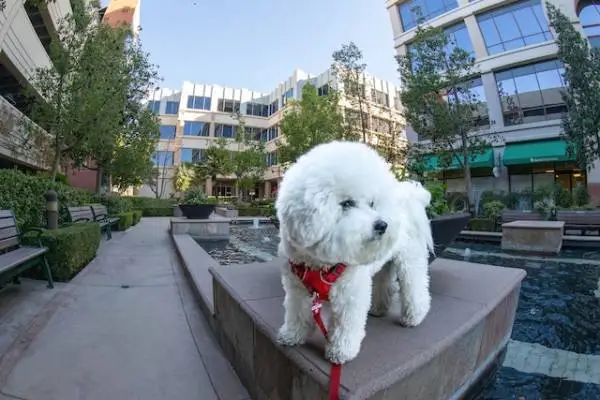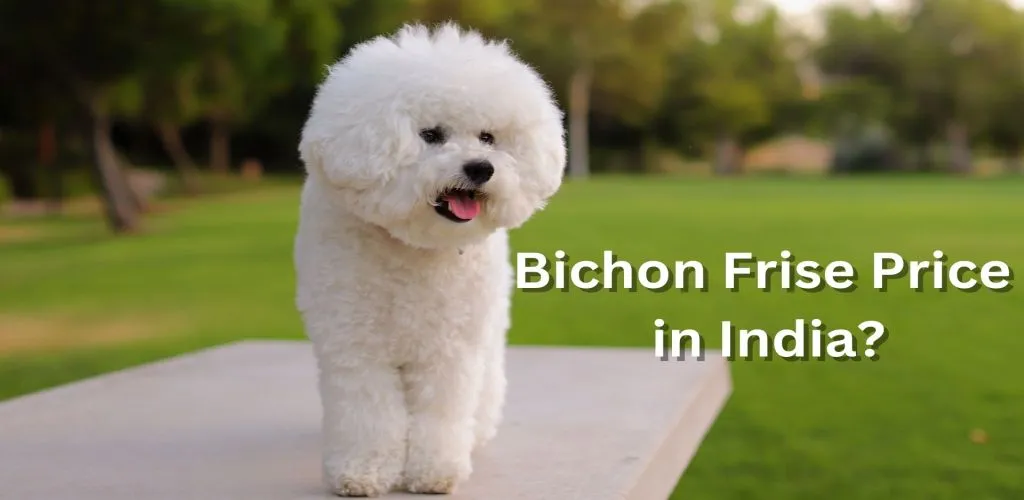Contents
- 1 Bichon Frise price in India
- 2 Factors affecting the Bichon Frise Price in India
- 3 Monthly Expenses of Owning a Bichon Frise in India
- 4 History Of The Bichon Frise
- 5 Appearance And Size
- 6 Temperament
- 7 Common Health Issues For The Breed
- 8 Grooming Requirements
- 9 Nutrition And Health Care
- 10 Training Tips
- 11 Considerations Before Buying A Bichon Frise In India
- 12 Pros and Cons of Owning a Bichon Frise
- 13 Amazing Facts About Bichon Frise
- 14 FAQ
- 15 Final Thoughts
Today, in Top Pet products we are talking about a cute little dog breed named “Bichon Frise” that looks like a children’s stuffed toy. This breed of small, white dog is incredibly friendly, loyal and loving – the perfect addition to any family! But have you ever wondered how much it would cost to get one in India? In this article, we’ll explore Bichon Frise price in India, things to consider before purchasing, Training Tips and more.
Bichon Frise price in India
The cost of a Bichon Frise puppy can vary depending on several factors such as pedigree, health records, vaccinations, etc. You should expect to pay anywhere from Rs 30,000 to 70,000 Rs for an pup. However, if you are looking for champion lines or purebreds with papers and documentation then it could easily cost you even more.
| Location | Price(Rs) |
|---|---|
| Bichon Frise Price in Mumbai | 30,000 to 70,000 Rs |
| Bichon Frise Price in Delhi | 30,000 to 70,000 Rs |
| Bichon Frise price in Kerala | 30,000 to 70,000 Rs |
| Bichon Frise price in Banglore | 30,000 to 70,000 Rs |
| Bichon Frise price in Pune | 30,000 to 70,000 Rs |
| Bichon Frise price in Hyderabad | 30,000 to 70,000 Rs |
| Bichon Frise price in Patna | 30,000 to 70,000 Rs |
| Bichon Frise price in Gurgaon | 30,000 to 70,000 Rs |
| Bichon Frise price in Tamil Nadu | 30,000 to 70,000 Rs |
| Bichon Frise price in Kolkata | 30,000 to 70,000 Rs |
| Bichon Frise price in Chennai | 30,000 to 70,000 Rs |
| Bichon Frise price in Punjab | 30,000 to 70,000 Rs |
| Bichon Frise price in Jaipur | 30,000 to 70,000 Rs |
| Bichon Frise price in Nagpur | 30,000 to 70,000 Rs |
Also, Read- American Eskimo Dog Price in India
Factors affecting the Bichon Frise Price in India

Breeder Reputation:
The reputation of the breeder is one of the most important factors that can affect the price of a Bichon Frise in India. Reputable breeders tend to charge higher prices for their puppies due to the fact that they are more experienced and knowledgeable about the breed.
Health Screening:
It is essential to have the puppy checked for any potential health issues before purchasing it. Health screenings can add to the cost of the Bichon Frise.
Pedigree:
The pedigree of the puppy can affect the price of the Bichon Frise. If the puppy has a long line of champions in its lineage, it may cost more than one with fewer champions.
Age:
The age of the puppy can also affect the price. Puppies tend to cost more than older dogs due to their higher energy levels and the fact that they may require more training.
Location:
The location of the breeder can also affect the price of the Bichon Frise. If the breeder is in an area with a higher cost of living, the puppies may cost more than those in a more rural area.
Supply and Demand:
The Bichon Frise is a popular breed, so the price may be higher if the demand for the breed is higher than the supply.
Colour:
The colour of the puppy can also affect the price. Some colours are rarer than others and may be more expensive.
Shipping Costs:
If the puppy needs to be shipped to its new home, the shipping costs may add to the price of the Bichon Frise.
Monthly Expenses of Owning a Bichon Frise in India
Feeding Cost:
Depending on the size of the dog and the quality of food, the cost of feeding a Bichon Frise can range from 1,000 to 3000 Rs per month.
Grooming Cost:
Professional grooming can cost you between 1,000 to 4,000 Rs per month, depending on how often you take your Bichon Frise to the groomer. It is possible to save money on grooming costs by grooming your Bichon Frise at home.
Vet and Vaccination Costs:
Regular vet visits and vaccinations are important for the health and well-being of your Bichon Frise. The cost of vet and vaccination care can fluctuate, but it is advisable to allocate a budget of 5,000 Rs to 10,000 Rs annually for regular maintenance.
Toys Cost:
Toys are a great way to keep your Bichon Frise entertained and engaged. Toys can range from 500 Rs to 1500 Rs, depending on the type of toy and how often you buy new ones.
Also, Read- Do Dogs Need Toothpaste?
History Of The Bichon Frise
Specifically, on the island of Tenerife in the Canary Islands, the Mediterranean region gave rise to the little breed of dog known as the Bichon Frise.
The breed was bred with other tiny dogs in France around the 16th century to create its current form. It is thought to have descended from the Barbet, a water dog.
The Bichon Frise first acquired favour among the French nobles and later as a circus dog.
During World Wars I and II, the breed came dangerously close to extinction, but breeders managed to save it in the 1950s.
The Bichon Frise is a popular companion dog in modern times, known for its upbeat personality and hypoallergenic coat.
Also, Read- Can Dogs Eat Guava?
Appearance And Size
Bichon dog is small in stature, with long white hair that doesn’t shed very much. Their ears are floppy and they have dark eyes that convey an expression of joy.
The average weight of these dogs ranges between 5-8 kilograms depending on gender differences which further adds to their charm.
They also have round heads, sturdy limbs and thick tails that curl upwards towards the back giving them a sweet and charming look.
The height of this breed usually falls within 23–30 cm or 9 to 11 inches , while it can be slightly smaller for females.
Also, Read- Can Dogs Eat Guava?
Temperament
Bichon dog has easygoing personality and loves to be around their owners. They are extremely affectionate and enjoy spending time with people, making them excellent family pets.
Their lively disposition makes them great playmates too! Despite being small in size they have plenty of energy and love to run around and explore.
Bred specifically as lapdogs, these pooches thrive off attention and love nothing more than cuddles on the sofa after a hard day’s play.
With an eagerness to please combined with gentle nature, this breed is incredibly intelligent and responsive – it won’t take long before you’ve got yourself a new best friend who’ll follow you everywhere you go!
Common Health Issues For The Breed
The Bichon Frise is a generally healthy breed, but as with all dog breeds, there are some health issues that may arise. It’s important to be aware of the potential risks associated with any breed so you can make an informed decision before purchasing a pup.
One common issue for this breed is allergies, which can cause skin irritation and discomfort. Allergies can also lead to ear infections due to excess moisture in the ears.
Additionally, the breed is prone to eye conditions such as cataracts or distichiasis (eyelashes growing on inner eyelids).
Some other hereditary issues include patellar luxation, hypothyroidism, hip dysplasia and Legg-Calve-Perthes disease.
Also, Read- Boerboel Price in India
Grooming Requirements
Bichon Frise requires regular grooming, which involves more than just an occasional bath. Although their coat is considered hypoallergenic, it still needs to be frequently groomed and brushed. This breed also requires monthly professional trims or haircuts in order to maintain its signature soft and fluffy appearance.
In addition to regular brushing, you’ll need to trim your Bichon’s nails every few weeks or so. Keeping them at the right length helps prevent any pain or discomfort when they walk on hard surfaces such as tile or concrete floors. You should also check for debris between their paw pads and clean out any excess dirt that may have built up there.
As with all breeds of dogs, a proper dental hygiene regimen is essential for the overall health of your pet. A good brushing routine will help keep your Bichon’s teeth healthy and free from decay caused by plaque buildup. Regular trips to your veterinarian can also ensure that their oral health stays in optimal condition.
Overall, taking care of a Bichon Frise isn’t too difficult if you stay on top of its grooming requirements; this low-maintenance breed simply needs a bit of extra attention now and then!
Nutrition And Health Care
Now that you have a better understanding of the grooming requirements for a Bichon Frise, let’s look at their nutrition and healthcare needs.
The breed is known to be relatively healthy with few genetic issues; however, they do require regular vet visits. Vaccinations should begin at 6-8 weeks old and continue throughout their life. Additionally, regular dental checkups are recommended as well as routine flea/tick treatments and heartworm preventatives.
When it comes to diet, Bichon Frises thrive on high-quality dry kibble specifically formulated for small dog breeds. Make sure to steer clear of any products made from wheat or corn since those can often cause allergies in dogs.
It’s also important not to overfeed your pup because this could lead to obesity which puts them at risk for certain health problems such as arthritis and diabetes. Here are some tips when it comes to feeding:
- Provide two meals per day instead of one large meal
- Use an appropriate-sized bowl so your pup doesn’t eat too quickly
- Make sure all treats are given in moderation
- Avoid human food unless specified by your veterinarian
Also, Read- English Mastiff Price in India
Training Tips
Training your Bichon Frise is essential and should be done with patience and consistency. Here are some tips to get started:
Begin by creating routines for daily tasks like feeding times, potty breaks, and playtime. This will help your pup understand what’s expected of him or her each day.
Start by teaching basic commands such as “sit”, “stay” and “come” using plenty of treats and positive reinforcement.
Keep in mind that dogs learn best when their lessons are short yet consistent – so take regular 5-10 minute sessions throughout the day to practice new commands. Don’t forget to reward good behaviour!
It’s also important to remember that all breeds have different personalities. If you find yourself getting frustrated during training sessions, it may be helpful to seek out professional guidance from an animal expert or dog trainer who specializes in Bichon Frises.
With the right instruction, identifying problem areas and addressing these issues head-on becomes much easier — resulting in fewer future behavioural problems down the line.
No matter how you train your furry friend, always remain calm and patient while doing so; this will allow them to pick up on cues more quickly without feeling overwhelmed or anxious. Ultimately, having a happy pup depends on putting in time and effort into their development – but it’ll be worth it once they master those tricks!
Considerations Before Buying A Bichon Frise In India

There are certain considerations that should be taken into account before making the purchase. It is important to ensure that the dog has been well cared for and that all of its needs have been met so as not to cause it any unnecessary stress or discomfort in its new home. Here are some key points to consider:
1. Investigate the Breeder –
When looking for a puppy, research the breeder thoroughly; visit their premises if possible and speak with them about the parents and upbringing of your potential pup. Ask questions such as health checks carried out on the pups, vaccinations given, etc., to make sure they have had optimal care prior to sale.
2. Living Arrangements –
Make sure you can provide suitable living arrangements for your Bichon Frise as this breed requires plenty of exercise and stimulation throughout its lifetime. Consider whether you have enough space inside and outside of your home where your pet will feel safe and secure at all times when not being supervised by an adult family member.
3. Commitment Level –
Owning a Bichon Frise requires commitment from owners who understand their particular temperament and training needs. This includes regular visits to the vet for check-ups, grooming appointments every two months or so, providing daily walks (at least 20 minutes), mental enrichment activities indoors/outdoors, socialization opportunities with other dogs, toys & treats for playtime fun, regular brushing sessions between groomings and more!
Also, Read- Jack Russell Terrier Price in India
Pros and Cons of Owning a Bichon Frise
Pros–
- Low shedding, hypoallergenic coat
- Highly intelligent, easily trained
- Loyal and affectionate
- Playful, energetic, and full of life
- Easy to groom and maintain
- Gets along with kids and other pets.
Cons-
- Prone to separation anxiety
- Prone to barking
- Can be stubborn and manipulative
- Maybe a bit demanding of attention
- Susceptible to some health issues
Amazing Facts About Bichon Frise
- Bichon Frise is French for “curly lap dog.”
- Bichon Frise has a playful and energetic personality.
- They are considered hypoallergenic dogs because they do not shed much.
- 4. They are loyal and friendly and make great family pets.
- Bichons are known for their intelligence and eagerness to please.
- Bichons can be trained to do tricks like dancing and rolling over.
- Bichon Frise has a long average lifespan of 12-15 years.
Also, Read- Bully Kutta Price in India
FAQ
1. How much does a Bichon Frise cost in India?
The Bichon Frise price in India can vary greatly depending on the breeder, location, and age of the dog. Generally, the price of a Bichon Frise in India ranges from around Rs. 30,000 to Rs. 70,000.
2. Are bichons available in India?
No, bichons are not available in India. Bichon Frise dogs are not a breed that can be found in India.
3. Do Bichons smell?
No, Bichons do not have a strong odour. They are considered to be hypoallergenic, which means that they don’t produce much dander or other allergens. However, they may still need regular grooming and bathing to keep their coats clean and healthy.
4. Do Bichons bark a lot?
Bichons relatively quiet breed, though they do tend to bark to grab the attention of the owner or alert them of something they find interesting or unusual.
5. Do Bichons cry?
Yes, Bichons may cry for a variety of reasons, including feeling anxious, being lonely, or needing attention. They may also bark or whine.
Final Thoughts
In conclusion, the Bichon Frise is a wonderful breed of dog to consider if you’re looking for a new pet. They have an impressive lifespan, and they are generally healthy dogs with few health issues. When purchasing or adopting one, it’s important to take into account their price in India, as well as any local regulations that may apply before bringing home your furry friend.
It’s also essential to ensure responsible breeding practices so that you can be sure your pup has been properly cared for from day one. With these considerations taken care of, I’m confident that anyone who brings home a Bichon Frise will find themselves with a loving companion for many years to come.
The Bichon Frise may not be the most popular breed in India, but this small yet mighty pup is certainly worth considering when choosing a pooch!
Hope you found it helpful
Thank you for Reading.
